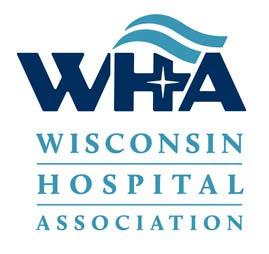





In 2023, Wisconsin’s health care system made significant strides in enhancing the quality of hospitals and acute care, advancing patient safety, addressing workforce challenges, supporting rural health, and combating the opioid epidemic to name a few. Collaborative efforts among health care providers have enhanced continuity of care, ensuring patients receive timely and effective treatment. These efforts highlight the remarkable work of our hospitals and health care providers, showcasing a commitment to improving health outcomes for all Wisconsin residents.
Wisconsin's culture of transparency and accountability has empowered health care teams to proactively identify and mitigate potential risks, creating a safer environment for all patients. With patient safety as a top priority, hospitals have invested in quality initiatives and staff training programs to enhance skills and awareness. These efforts have led to significant reductions in hospitalacquired infections, including CLABSI, CAUTI, C. diff and MRSA.
The health care workforce faced considerable challenges in 2023, leading to widespread staffing shortages across all disciplines. In response, Wisconsin hospitals expanded wellness programs to support staff well-being, including mental health and stress management resources, as well as initiatives promoting work-life balance. Efforts were also made on the recruitment and retention of health care professionals to build a more robust and resilient workforce.
Rural health remains a critical focus, with efforts aimed at reducing disparities in health care access and quality for rural populations. Telehealth services have been expanded to connect rural patients with specialists and primary care providers, overcoming geographical barriers and ensuring equitable access to high-quality care.
The opioid epidemic continues to pose significant challenges, but Wisconsin hospitals have taken action to address this crisis. The implementation of the Overdose Response Protocol (ORP) and the distribution of Hospital Overdose Prevention Effort (HOPE) Kits, which include naloxone and other risk reduction resources, have saved countless lives. Hospitals have also enhanced their capacity to offer medication-assisted treatment (MAT) and are integrating behavioral health services to support individuals struggling with opioid use disorders.
The collective achievements of Wisconsin hospitals in 2023 reflect a deep commitment to health care excellence. Innovations in care delivery, unwavering dedication to patient safety, proactive measures to support the workforce, targeted efforts to improve rural health, and robust responses to the opioid epidemic underscore the exceptional work carried out by health care providers across the state. These accomplishments not only enhance the quality of care but also transform health care in Wisconsin. The insights gained from our hospitals’ pursuit of quality improvement highlight the potential for continued advancements in health outcomes. As we move forward, the lessons learned and the innovative strategies employed will serve as a foundation for building a more effective, equitable and sustainable health care system in Wisconsin.
This report is a testament to the successful initiatives and stories shared by our health care community.

Eric Borgerding WHA President and CEO

Bobby Redwood, MD WHA Physician Quality Improvement Advisor

Nadine Allen Chief Quality Officer nallen@wha.org

Stacy Kopp, Clinical Quality Improvement Manager skopp@wha.org

Jill Lindwall Quality Improvement Director jlindwall@wha.org

Marcia Egle Administrative Assistant megle@wha.org

Jenny Pritchett, Clinical Quality Improvement Manager jpritchett@wha.org

Kelli Evenson Administrative Assistant kevenson@wha.org

Casey Zimpel, Clinical Quality Improvement Manager czimpel@wha.org

Amber Hollerich Health Care Data Analyst ahollerich@wha.org
The Wisconsin Hospital Association’s (WHA) 2024 Health Care Quality Report, "Data-Driven Excellence: Enhancing Health Outcomes through Quality Measures," delves into the pivotal role of data and quality metrics in transforming health care delivery and outcomes. By harnessing comprehensive data and aligning innovative quality initiatives, our hospitals and health systems aim to drive improvements in patient care and community health. Throughout this report, we explore the innovative strategies and best practices employed across Wisconsin's health care systems, highlighting their commitment to excellence and our continuous efforts to create a healthier future for all.
Wisconsin hospitals have proven their ability to navigate resource and workforce challenges with dedication, compassion and adaptability, always emphasizing a patient-centered approach. A strong culture of quality and patient safety has enabled hospitals to maintain high standards consistently.
Wisconsin is frequently recognized as a for patient safety outcomes. TOP STATE





For 20 years, Wisconsin's acute-care and critical access hospitals have voluntarily reported more than 40 measures of quality and patient safety through WHA’s CheckPoint website. This platform facilitates benchmarking and progress comparisons among hospitals, encouraging the sharing of best practices and fostering collaboration for rapid improvements.
Nationally, Wisconsin is frequently recognized as a top state for patient safety outcomes by agencies such as the Centers for Medicare & Medicaid Services (CMS), the Agency for Healthcare Research and Quality (AHRQ), and U.S. News & World Report. (In the CMS Star Ratings, 27% of Wisconsin hospitals received the highest five-star rating, double the national average.)
Quality improvement projects remain crucial in this ever-changing environment. Wisconsin hospitals utilize data and analytics to prioritize projects that tangibly improve care, with many hospitals showcasing their initiatives led by both clinical leaders and front-line caregivers. These efforts, driven by a commitment to quality, have had a significant impact on patient care and the overall health of the community.
Wisconsin hospitals have managed care coordination and collaboration, integrated virtual and in-person care, promoted health care worker wellness and leveraged digital health tools in a wide range of services to meet the needs of the community.
The WHA quality team recognizes the passion and commitment to quality within our health care community. Looking back, WHA expresses gratitude for the health care community's achievements in 2023. The WHA quality team remains committed to supporting member hospitals in sustaining and extending Wisconsin’s strong health care quality performance.
Twenty-eight (28) of the measures displayed on CheckPoint showed improvement over the 2023 calendar year and boast outcomes such as a reduction in catheter-associated urinary tract infections (CAUTI) by 26.7%, a remarkable 39.7% reduction in acute stroke incidents, and patient experience scores for discharge instructions ranking #1 in the nation for all of 2023.

The mission of CheckPoint is to serve as a consumerfocused website that provides reliable, valid measures of health care in Wisconsin hospitals, to facilitate the selection of quality health care and assist quality improvement activities within Wisconsin’s hospital community. To ensure health care measures remain evidencebased, aligned to state and national priorities, and timely and comparable, the CheckPoint tool is led by a Quality Measures Team. The team represents more than 94 hospitals and eight health systems in Wisconsin with the goal to bring forward a broad perspective for tracking measures that are suitable for all hospital sizes, applicable to the geography and representative of the populations they serve.
Quality Measures Team members:
• Linda Drummond, UW Health
• Holly Francis, Mercyhealth Hospital and Trauma Center, Walworth
• Josee Gill, Bellin Health
• Jason Gillis, HSHS WI Division
• Mbonu Ikezuagu, ThedaCare
• Christine Klement, Aspirus Langlade
• Dennise Lavrenz, WONL representative
• Amy Margeson, Advocate Aurora Health
• Kris Melaas-Merkel, Aspirus Health
• Kayla Mobley, Tomah Health
• Tom Rampulla, Ascension Wisconsin
• Lisa Sheldon, Gundersen Health System
• Colleen Sparr, SSM Health WI Regional Office
• Janet Wagner, Rural Wisconsin Health Cooperative
Kris
There are many ways to measure hospital quality and safety from claims measures to manually abstracted measures to patient experience data. The fact of the matter is that understanding hospital quality and safety measures and data is complex. Wisconsinites are fortunate to benefit from WHA’s progressive approach to publicly reporting quality and safety data via CheckPoint. WHA continues to lead the way in quality data transparency and strives to enhance consumer accessibility and understanding of the information. I am grateful for the WHA team and their collaboration with the Quality Measures Team to support CheckPoint in being a valuable resource to patients and health care professionals.
Kris Melaas-Merkel
CheckPoint recently celebrated 20 years of being a nationwide leader providing transparent reporting of more than 40 quality metrics for Wisconsin hospitals. It fosters a culture of collaboration over competition and meets the demands from clinicians and consumers for information on the quality of care provided to patients and communities.
CheckPoint has produced results by helping Wisconsin hospitals improve the quality of care they provide. By sharing information, Wisconsin hospitals can benchmark their progress against other hospitals in the state. In addition, the CheckPoint initiative has been a catalyst for Wisconsin hospitals to contact peers that are doing well in a clinical area to identify best practices that can be implemented in their own organization. This sharing of best practices facilitates rapid improvement.
https://checkpoint.wha.org
CheckPoint provides consumers information on both process measures and outcome measures. Process measures reflect clinical interventions that medical experts agree should be provided during a hospital stay, such as appropriate use of medications or patient education. Outcome measures include patients' perceptions of care and results of the care provided, such as complications, infections and mortality.
The figure below shows Wisconsin hospital outcomes data highlighting some of the measure improvements for recent 12 months of publicly available data:
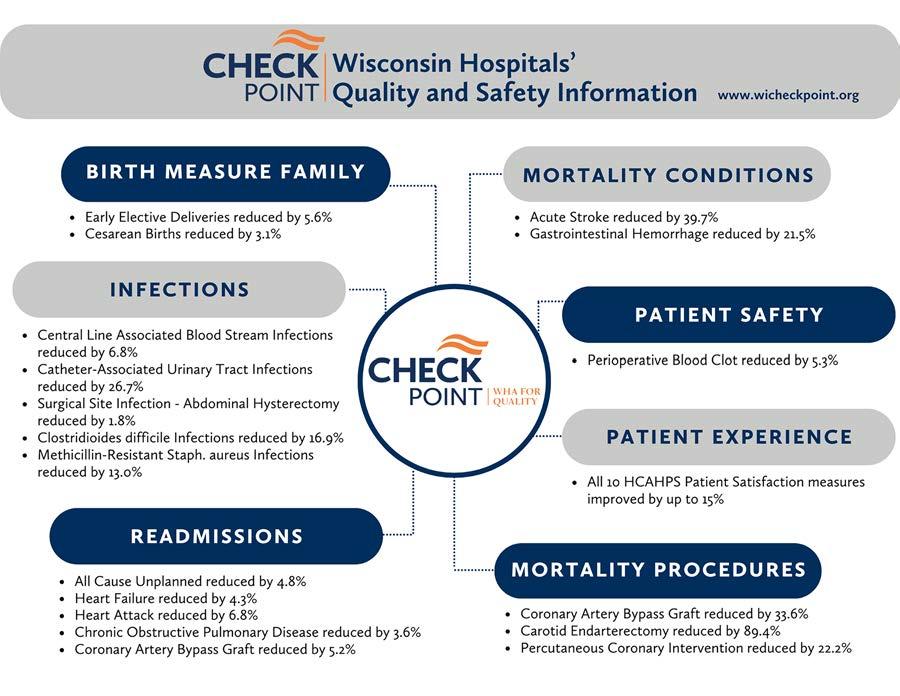
A few of these successes are noted below:
The COVID-19 pandemic impacted Healthcare-Associated Infection (HAI) rates within hospitals both nationally and at the state level, emphasizing the need for balancing COVID-related demands with routine hospital infection prevention. In 2020, significant increases were observed nationally for central line-associated blood stream infections (CLABSI), catheter-associated urinary tract infections (CAUTI), ventilator-associated events (VAE), clostridioides difficile infections (CDI), and methicillin-resistant staphylococcus aureus (MRSA) bacteremia compared to 2019. The largest increases occurred in the fourth quarter of 2020. Wisconsin is one of the leading states improving HAI rates across the board.
According to the Centers for Disease Control and Prevention 2022 annual National and State HAI Progress Report, acute care hospitals nationally between 2021-2022 have shown:
• 9% decrease in CLABSI
• 12% decrease in CAUTI
• 16% decrease in hospital onset MRSA bacteremia (MRSA in the bloodstream)
• 3% decrease in hospital onset C. difficile infections (CDI)
In Wisconsin, the CAUTI, CLABSI, VAE, MRSA bacteremia, and CDI standardized infection ratios (SIRs) for Wisconsin acute-care hospitals were significantly lower in 2022 than the 2015 national baseline. The SIR is the ratio of the observed number of infections (events) to the number of predicted infections (events) for a summarized time period. The key takeaway is the performance exceeding the goal of having the SIR less than 1.0.
SIRs for Wisconsin acute-care hospitals by HAI type (2022):
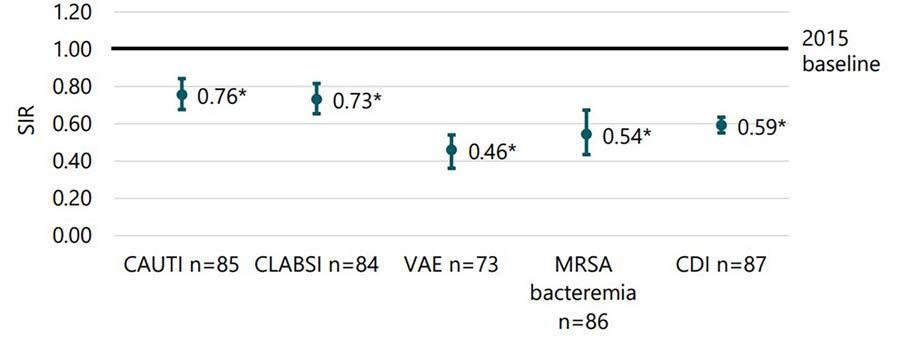
Source: Wisconsin Department of Health Services 2022 Annual Report
Hospitals in the state of Wisconsin continue to lead many quality improvement efforts in reducing infection rates and promoting optimum patient safety outcomes.
References:
• Centers for Disease Control and Prevention. 2022 National and State Healthcare-Associated Infections Progress Report
• Wisconsin Department of Health Services. 2022 Wisconsin HAI Prevention Program Annual Report.
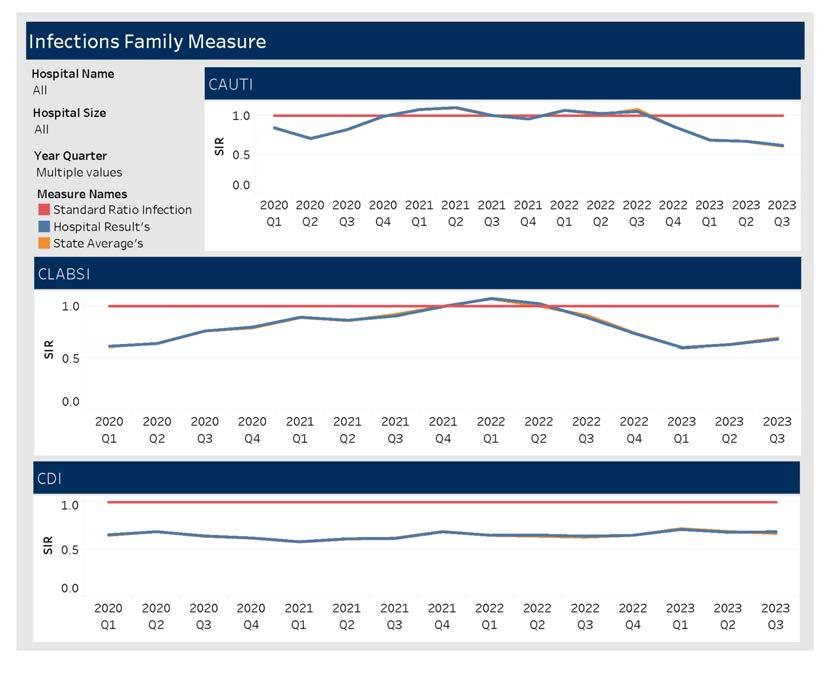
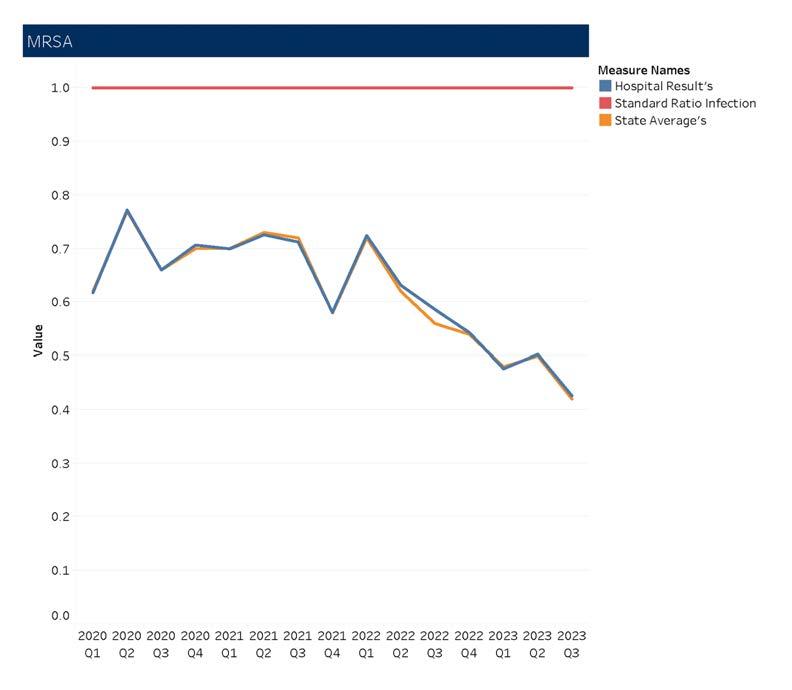
As shown in the graphs below, Wisconsin hospitals in aggregate performed better than the national average with the top 10% (State Benchmark) showing results up to 15% higher than hospitals nationally. In fact, all 10 measures of nationally reported patient satisfaction data show Wisconsin hospitals performing better than the national average. Specifically for discharge information, Wisconsin’s score of 80% for all of 2023 was the #1 highest ranking in the United States. Four of those measures are highlighted below.

Measure Name: Staff Provided Discharge Instructions
Wisconsin patient experience scores for discharge instructions ranked #1 in the nation for all of 2023.
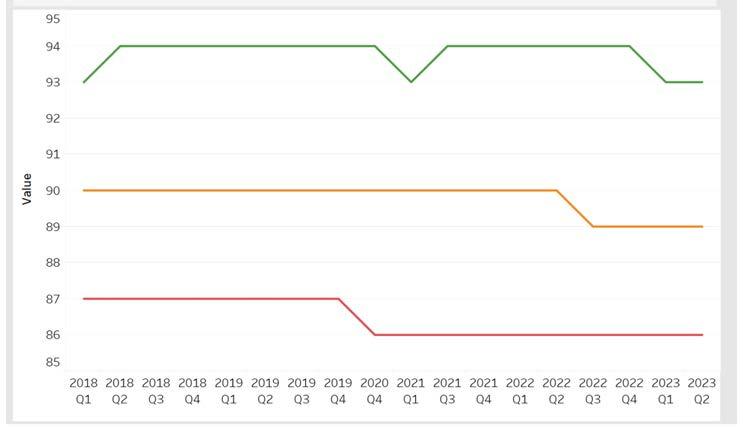
Measure Name: Patient Rated Hospital High
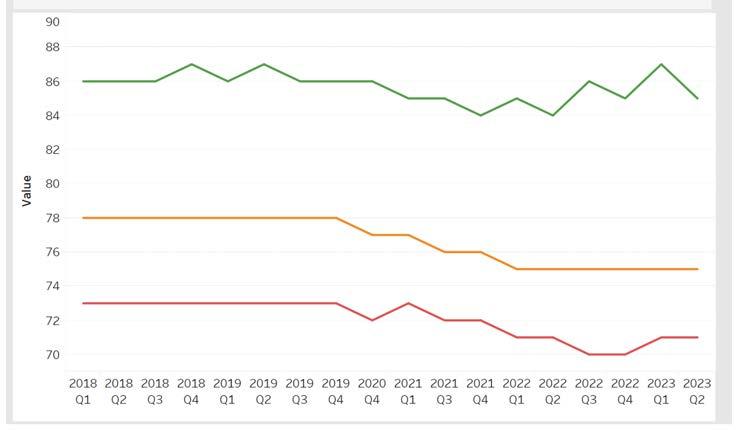
Wisconsin patient experience score for overall hospital ratings

Measure Name: Doctors Always Communicated Well

Wisconsin patient experience score for Communication with Doctors - how well the doctor(s) communicated
Measure Name: Nurses Always Communicated Well

Wisconsin patient experience score for Communication with Nurses - how well the nurse(s) communicated
Consumers have many ways to review and compare quality and patient safety outcomes as evidenced by the multitude of ranking and rating dashboards and scorecards publicly available. This not only demonstrates the transparency of the data but gives a variety of perspectives of what good quality should look like. Each program identifies measures to report on from numerous secondary data sources and publicly reports this data.
In 2022, the Centers for Medicare & Medicaid Services (CMS) launched the CMS National Quality Strategy (NQS), a plan aimed at improving the quality and safety of health care for everyone, with a special focus on people from underserved and under-resourced communities. The CMS NQS builds on CMS’ efforts to improve health care quality for individuals across their lifespan and continuum of care by using all the Agency’s levers. Quality measures are a key tool for CMS to identify opportunities for improvement and evaluate progress. CMS is shaping a measure ecosystem that focuses on improving outcomes, driving value-based care and reducing provider reporting burden. Results from a few of those programs are as noted below and remain priorities of Wisconsin hospitals.
The Hospital Inpatient Quality Reporting (IQR) Program was developed because of the Medicare Prescription Drug, Improvement and Modernization Act of 2003. Section 5001(a) of Public Law 109-171 of the Deficit Reduction Act of 2005 provided new requirements for the Hospital IQR Program, which was built on the voluntary Hospital Quality Initiative.
The Hospital IQR Program is intended to equip consumers with quality of care information to make more informed decisions about health care options and is intended to encourage hospitals and clinicians to improve the quality of inpatient care provided to all patients. The data gathered through the program is available to consumers on the Care Compare website with some measures also available for Wisconsin hospitals on WHA’s CheckPoint website.
According to the Centers for Medicare and Medicaid Services (CMS), the Hospital Value-Based Purchasing (VBP) Program is part of the long-standing effort by the Centers for Medicare & Medicaid Services (CMS) to link Medicare's payment system to health care quality in the inpatient setting. Some hospitals are excluded from the VBP, such as critical access, psychiatric, rehabilitation, children’s, cancer clinics and others.
The Hospital VBP Program is designed to promote better clinical outcomes for hospital patients, as well as improve their experience of care during hospital stays while reducing costs.
Specifically, Hospital VBP seeks to incentivize top performing hospitals to improve the quality and safety of care that patients receive during acute-care inpatient stays by paying bonuses from a 2% withhold from all participants. Incentives are assigned to hospitals that score higher than average when comparing a hospital’s “achievement” and “improvement” for each measure in the program as displayed in the table below.

Payment adjustment effective for discharges from October 1, 2023, to September 30, 2024
Mortality Measures Baseline Period July 1, 2014–June 30, 2017
In FFY 2023 and 2024, CMS suppressed the data due to the COVID-19 pandemic. Scores were calculated, but awards and penalties were not assessed. In FFY2024, more Wisconsin hospitals earned bonus money in the > 1% category than in recent years. The graph below shows how this additional bonus payment has increased over the last four reporting periods.
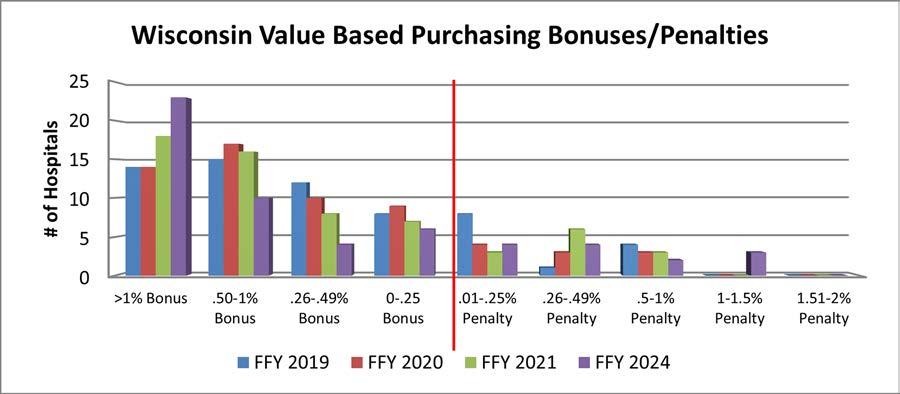
Nationally, Wisconsin ranks in the top five (#5) of states achieving the highest monetary gains for goal achievement and improvement in this program. For more information, refer to the VBP FY 2024 Resources.
The Hospital-Acquired Condition (HAC) Reduction Program is a Medicare value-based purchasing program that reduces payments to hospitals based on how they perform on measures of hospital-acquired conditions. The HAC Reduction Program encourages hospitals to implement best practices to reduce their rates of healthcare-associated infections (HAIs) and improve patient safety.
The program adjusts payments to hospitals that rank in the worst-performing quartile (above the 75th percentile). On an annual basis, CMS evaluates overall hospital performance by calculating a Total HAC Score for each hospital as the equally weighted average of their scores on measures included in the program. Hospitals with a Total HAC Score greater than the 75th percentile of all Total HAC Scores will receive a payment reduction of 1% on overall Medicare fee-for-service (FFS) payments.
The HAC Reduction Program includes the following six quality measures:
• One claims-based composite measure of patient safety:
• CMS Patient Safety and Adverse Events Composite (CMS PSI 90)
• Five chart-abstracted or laboratory-identified measures of HAIs submitted to the Centers for Disease Control and Prevention's National Healthcare Safety Network:
• Central Line-Associated Bloodstream Infection (CLABSI)
• Catheter-Associated Urinary Tract Infection (CAUTI)
• Colon and Abdominal Hysterectomy Surgical Site Infection (SSI)
• Methicillin-resistant Staphylococcus aureus (MRSA) bacteremia
• Clostridium difficile Infection (CDI)
Due to the COVID-19 pandemic, there were no penalties assessed during 2023.

Seventy-three (73) percent of eligible Wisconsin hospitals do not receive a penalty in the HAC Reduction program. For more information, refer to the HAC Reduction Program FY 2024 Fact Sheet
The Hospital Readmissions Reduction Program (HRRP) is a Medicare value-based purchasing program that reduces payments to hospitals with excess readmissions. CMS includes readmission measures for specific conditions or procedures that significantly affect the lives of many Medicare patients. Under HRRP, hospitals are, for example, encouraged to improve communication and care coordination to better engage patients and caregivers in discharge plans and, in turn, reduce avoidable readmissions.
CMS includes the following measures in its Hospital Readmissions Reduction Program (HRRP) assessment:
• Acute myocardial infarction
• Heart failure
• Pneumonia
• Chronic obstructive pulmonary disease
• Total hip and/or total knee arthroplasty
• Coronary artery bypass graft surgery
Payments within this program may be reduced by up to 3% depending on the performance outcomes for each of the six identified measures. In 2024, twenty Wisconsin hospitals (31% of eligible hospitals, up from 27% last year) will receive no penalty this year.
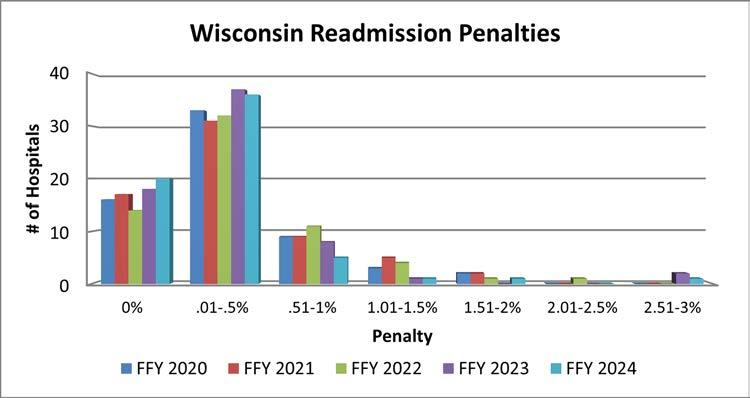
For both FY 2023 and FY 2024, Wisconsin is ranked #15 nationally for states receiving the lowest dollar amount of penalties in this program. For more information, refer to the HRRP FY 2024 Fact Sheet.

1. Mortality
2. Safety of Care
3. Readmissions
4. Patient Experience
5. Timely & Effective Care
Hospitals have long been pioneers in quality measurement and have long shared safety and quality data with the public. The large volume of information on the Care Compare website, Provider Data Catalog, and the specialized focus of many of the measures publicly reported could overwhelm patients and consumers. The intent of the Overall Star Rating (refreshed in July 2024 with data through January 2024) is to summarize a wide range of publicly reported measures in a single metric. The Overall Star Rating reflects 46 measures across five aspects of quality:
The Overall Star Rating supplements, rather than replaces, the information on Care Compare.
There was a decrease in the number of rated hospitals this year and the number of five-five-star rated hospitals can be attributed to the decline. Eighteen out of 67 hospitals in the state that received ratings earned five stars. Twenty-eight earned four stars, 18 received three stars, two had two stars and one received a single star. The ratings summarize several measures related to mortality, safety, readmissions, patient experience and timely, effective care. Sixty-nine percent of the hospitals rated in the state received four or five stars, greater than the average of 40%.
The following national and local statistics representing the stratification of Star Ratings across all U.S. hospitals are below.
N = 2847
The following table shows how Wisconsin hospitals performed compared to the national data above.
67
Additionally, Wisconsin hospitals are a national leader on patient experience measures with 25 Wisconsin hospitals receiving a top five-star rating.
For the 21st year, and directed by the U.S. Congress, the Agency for Healthcare Research and Quality (AHRQ) published their National Healthcare Quality and Disparities Report that assesses the performance over six priorities: patient safety, person-centered care, care coordination, effective treatment, healthy living and care affordability, and more than 250 measures of quality and disparities covering a broad array of health care services and settings. AHRQ provides an overview by state called the “State Snapshots” on their website that allow consumers and private partners to better understand health care quality and disparities in each state. Data comes from a variety of sources and represents multiple care settings. This comparison presents the care by setting in which it shows improvement over the baseline. State Snapshots were most recently issued by AHRQ in December 2023 and show a summary of improvement in hospital quality over the baseline results.

Also published in the AHRQ December 2023 National Healthcare Quality and Disparities Report, Wisconsin is ranked in the top quartile for best quality across all states. Scores are based on the number of measures above, at, or below the average across all states and can be seen on the map below.

A separate source that provides quality ratings and rankings, The Commonwealth Fund, posted their Scorecard on State Health System Performance in June 2023. Each year The Commonwealth Fund posts their scorecard based on the latest available data for more than 58 measures to assess how well health care organizations provide high-quality, accessible, and equitable health care.
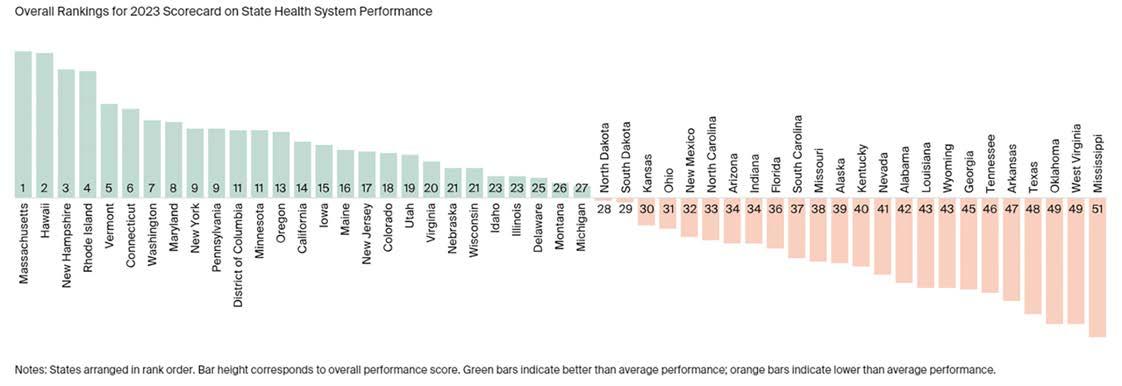
Data transparency allows the opportunity to look for areas of improvement and is an important aspect of improving patient outcomes and advancing care.
Wisconsin remains at #21 overall for both 2022 and 2023 in addition to moving up to the #1 spot leading five states in the Great Lakes region.
Wisconsin scored 11th highest in the nation on women’s health and reproductive care, listed as one of the “top performing states” by The Commonwealth Fund.

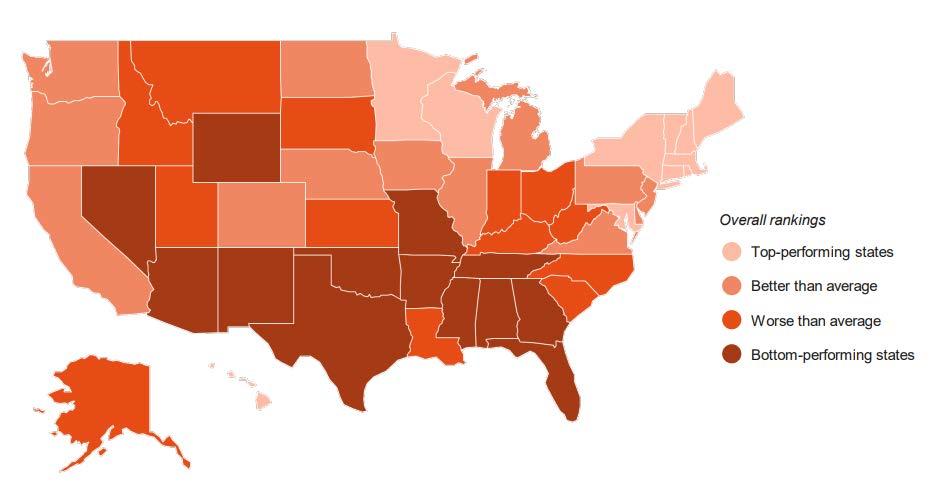
The annual quality report details how Wisconsin hospitals utilize data to create initiatives, improve safety protocols, reduce medical errors and prevent patient harm, emphasizing quality improvement and patient safety.

WHA launched the inaugural Quality & Patient Safety Awards program to honor hospitals advancing patient outcomes in Wisconsin. The program features two award categories: Excellence in Health Care Quality and Patient Safety, and Hospital Mentorship and Quality Champion.
The Excellence in Health Care Quality and Patient Safety Award recognizes hospitals taking innovative steps to enhance quality, patient safety and outcomes. Awards are given in three bed-size categories. The Hospital Mentorship and Quality Champion Award acknowledges hospitals demonstrating mentoring relationships and engagement through active participation, collaboration, and sharing of tools and resources with other hospitals.
The 2023 winners for the Excellence in Health Care Quality & Patient Safety Award were:
• Tomah Health for MOVIN® - Mobilizing Older Adults Via a System-Based Intervention (0-25 bed size category)
• Aurora Medical Center, Mount Pleasant for Improving Care for Older Adults through Age-Friendly Implementation (26-99 bed size category)
• Children’s Wisconsin, Milwaukee for Embedding Food Insecurity Screening and Follow-Up in a Pediatric Emergency Department (100+ bed size category)
The Hospital Mentorship & Quality Champion Award recipient was:
• Fort HealthCare Award recipients presented an overview of their work and received a plaque at a recognition dinner.
Honorable Mention recognition for the Excellence in Health Care Quality & Patient Safety Award went to Reedsburg Area Medical Center, Westfields Hospital and Clinic, Aurora Medical Center-Kenosha, Aurora Medical Center-Manitowoc County, Ascension Wisconsin/St. Elizabeth Hospital, and Aurora Medical CenterWest Allis. Aurora Medical Center also received an Honorable Mention for the Hospital Mentorship & Quality Champion Award.




The second annual Health Care Quality Showcase on March 20, 2024 was held in the Capitol Rotunda, and featured hospitals’ quality and patient safety improvement efforts. This valuable opportunity informed elected officials, Advocacy Day attendees from around the state, and the public about quality and patient safety-focused advancements in Wisconsin’s hospitals. To read more about the posters and the projects, see the Hospital Quality Improvement Project section of this report on page 30.

On January 10, 2024, twelve Wisconsin hospital quality improvement leaders were awarded certificates for completing the 2023 Wisconsin Quality Residency Program. Transitioning into a new role as a health care quality leader involves mastering numerous core concepts and leadership essentials. This 12-month program, specifically designed for new quality leaders with limited experience in quality improvement and patient safety in a hospital setting, offers a comprehensive curriculum taught by field experts.
The program's modules cover vital topics such as regulatory and accreditation requirements, basic risk management skills, quality data reporting methods and effective quality improvement techniques. Established through a collaboration between WHA and the Rural Wisconsin Health Cooperative (RWHC) and sponsored in part by the Wisconsin Office of Rural Health, the program aims to equip new leaders with the necessary skills and knowledge to excel in their roles.
Congratulations to our recent Wisconsin Quality Residency graduates!
• Anna Allen, Gundersen St. Joseph’s Hospital
• Jena Cornell, Tomah Health
• Carrie Easterly, Gundersen Moundview Hospital
• Kayla Ficker, Amery Hospital
• Tawyna Koenig, St. Croix Health
• Sara Kress, Tamarack Health-Hayward
• Wendy Larson, Lakeview Hospital, MN
• Jessica Roundy, Prairie Ridge Health
• Jean Ann Schroeder, Edgerton Hospital
• Tiffany Sturgal, Tamarack Health Ashland
• Ellen Thompson, Western Wisconsin Health
• Brenda Williams, Beloit Health System
These leaders are now better equipped to drive quality improvement and patient safety initiatives in their respective hospitals.

WHA stands as one of eight vital organizations that make up the Superior Health Quality Alliance (Superior Health), comprising the Quality Innovation NetworkQuality Improvement Organization (QIN-QIO), Hospital Improvement Innovation Network (HIIN), and End Stage Renal Disease Network (ESRD). These entities, alongside WHA, have driven success and achievement of Medicare quality improvement goals. This "Power of Eight" consists of:
1. Illinois Health and Hospital Association
2. Metastar
3. Michigan Health & Hospital Association
4. Midwest Kidney Network
5. Minnesota Hospital Association
6. iMPROve Health
7. Stratis Health
8. Wisconsin Hospital Association (WHA)
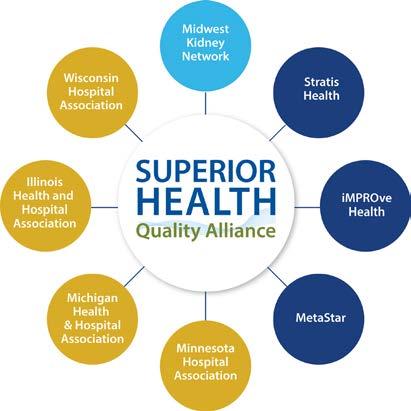
Together, they collaborate with hospitals, providers, community stakeholders, beneficiaries and nursing homes, directing their efforts toward enhancing care quality and patient outcomes across Michigan, Minnesota and Wisconsin.
WHA offers continuous technical assistance with a focus on fostering person and family engagement, implementing health equity practices, engaging hospital leadership and addressing priority areas in patient safety. This assistance takes various forms, including webinars, learning action networks, podcasts, affinity groups, improvement sprints, 1:1 coaching calls and check-in calls for hospital quality leaders and teams. Moreover, WHA facilitates participant networking, grants access to evidence-based resources, and promotes communication of events and opportunities through the monthly newsletter, Superior Health Connect and an online community forum.


Since early 2021, WHA and Superior Health, as the Hospital Quality Improvement Contract (HQIC) under IPRO, have been bolstering patient safety processes and implementing quality improvement strategies for hospitals in Michigan, Minnesota and Wisconsin. This effort extends to about 270 rural, critical access and acute-care hospitals across 12 states. Of these, Superior Health supports 124 hospitals, with WHA specifically aiding 32 rural and/or critical access hospitals among them.
Source: CMS data submission reports-Hospital Quality Improvement Contract-October 2022-November 2023
In 2023, 69% of Wisconsin hospitals engaged in one or more educational offerings, with over 45% participating in two or more.
In its fourth year with CMS, WHA's quality improvement team collaborates with Superior Health in the Partnerships for Community Health and Nursing Home Quality Improvement Collaborative. Together, they support community organizations and nursing homes in achieving goals set forth by CMS.
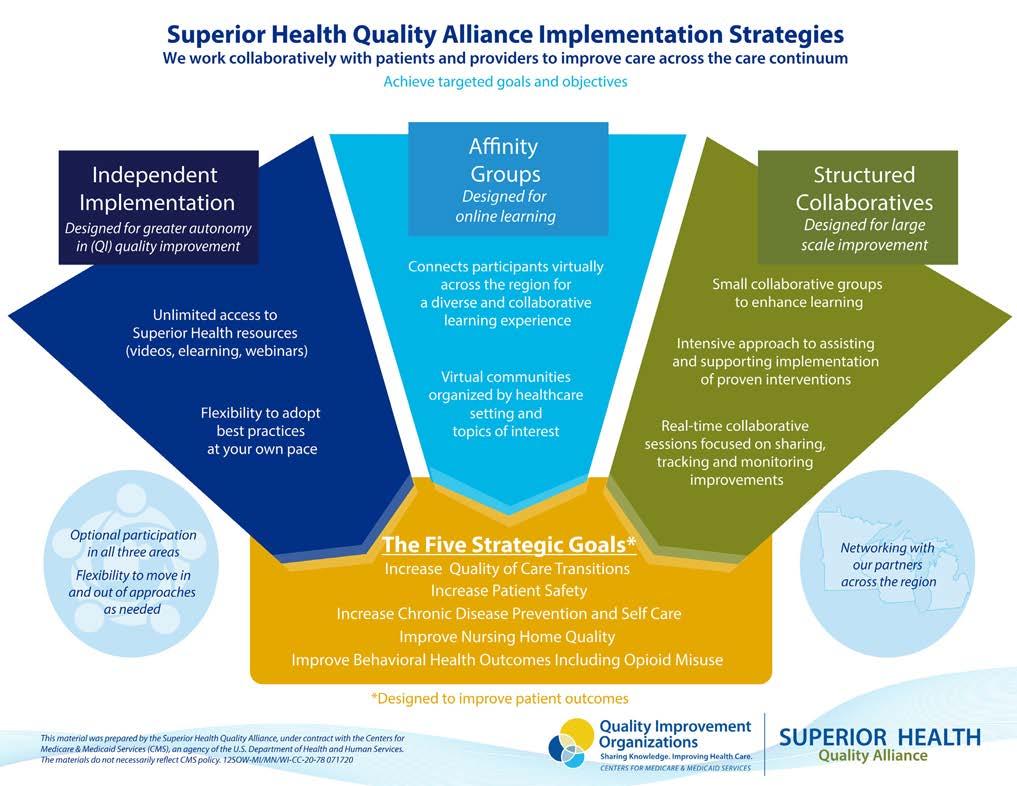
Superior Health assists 1,007 nursing homes across Michigan, Minnesota and Wisconsin, while WHA serves 325 nursing homes in Wisconsin. CMS has identified seven focus areas for improvement, including 1) Opioid Utilization and Misuse; 2) Patient Safety; 3) Chronic Disease Self-Management; 4) Care Coordination; 5) Infection Prevention and Control; 6) Immunizations; and 7) Training.
In the past year, various education and training resources were created, such as tools to prevent skilled nursing facility rehospitalizations within 30 days, videos on identifying and responding to resident changes in condition, and educational toolkits to promote adherence to staff and resident vaccinations. Notable initiatives included reducing opioid adverse events, boosting vaccination rates among nursing home staff and residents, ensuring all nursing homes have emergency response plans and lowering 30-day hospital readmissions for Medicare beneficiaries.
Measure
Decrease opioid adverse drug events in high-risk patients, including deaths
Increase percentage of Medicare beneficiaries with hypertension diagnosis and adequately controlled (<140/90 mmHg) blood pressure
Increase percentage of outpatient Medicare beneficiaries who experienced a Medicare coverable cardiac event/diagnosis and have not already participated in an early outpatient cardiac rehabilitation/secondary prevention (CR) program for the qualifying event/diagnosis who were referred to a CR program
Decrease percentage of Medicare beneficiaries with diabetes who had A1c > 9.0.
Slow the progression of chronic kidney disease to prevent ESRD.
number of 30-day hospital readmissions for
WHA’s quality improvement team participates in health disparities initiatives to reduce health disparities and address social drivers of health (SDOH) impacting health equity. The health disparities team provides content expertise and assists with facilitating the implementation of Superior Health’s goals for promoting health equity and person and family engagement across the continuum of care. The work of identifying and addressing health disparities ensures everyone has a fair and just opportunity to be as healthy as possible.
Approximately 323 community-based organizations in Wisconsin participate in the Partnerships for Community Health (PCH) initiative, aiming to enhance community members' well-being. WHA collaborates with Superior Health to support PCH participants through various coalitions and collaborations, fostering both short- and long-term partnerships. WHA's quality team actively contributes to Superior Health's chronic disease management goal team, focusing on initiatives to improve chronic disease prevention and self-care across key areas such as diabetes, chronic kidney disease and hypertension.
Participating hospitals and health systems working collectively to advance community health initiatives and drive positive outcomes in Wisconsin's communities are:
• Aurora BayCare Medical Center
• Aurora Healthcare
• Aurora Medical Center – Kenosha
• Bellin Health
• Door County Medical Center
• Gundersen Health System
• HSHS Saint Vincent Hospital
• HSHS St. Mary's Hospital - Green Bay
• Mayo Clinic Health System - Franciscan Healthcare
• SSM Health - Monroe Clinic
• SSM Health St. Mary's Hospital
• ThedaCare Regional Medical Center - Appleton
• UnityPoint Health - Meriter
• UW Health
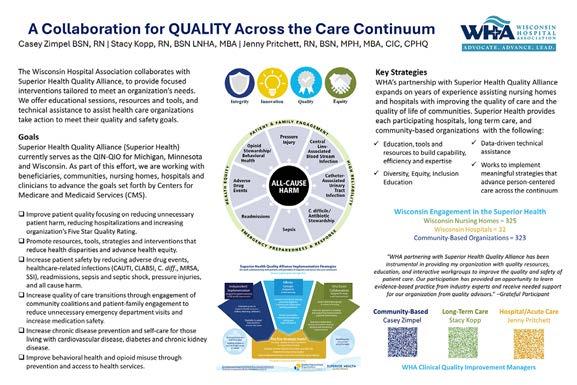
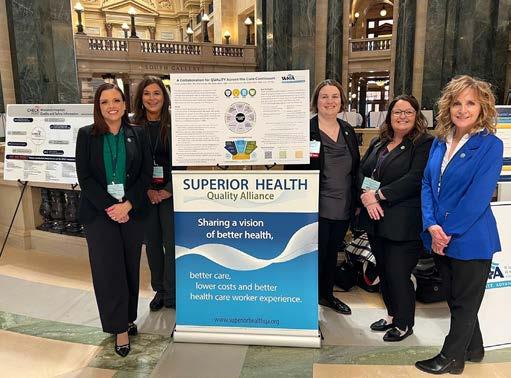

WHA Quality Director Jill Lindwall, MSN, RN, CPHQ, and Principal Investigator Alicia Pilarski, DO, led the 2023 HEALtHy WI initiative. This comprehensive assessment aims to understand factors driving workforce attrition and identify strategies to prevent burnout in Wisconsin health care. Surveying over 150 leaders, the team crafted a tailored workforce well-being survey, which concentrated on three main areas. First, it assessed general well-being, burnout levels and employee engagement. Second, it examined both positive and negative factors influencing well-being within and outside organizations. Lastly, it evaluated the presence and effectiveness of existing workforce well-being programs and resources.
Survey participants were also queried about their organization's well-being efforts, encompassing the presence of dedicated wellbeing personnel or committees and access to programs providing physical, emotional, financial and spiritual support, and system initiatives aimed at enhancing workforce well-being.
Respondents were invited to engage in two Human-Centered Design (HCD) sprints in June and October 2023. These sessions were led by experts from the Kern Institute Human-Centered Design Laboratory.
The first HCD sprint generated innovative ideas focused on enhancing care delivery amid staffing constraints, restructuring healthcare work environments, setting realistic productivity expectations, fostering work-life integration, and identifying effective well-being programs. The session's outputs were categorized into five top priorities:
1. Existing care workflow models and tools.
2. Desired resources for medical teams.
3. Access methods for these resources.
4. Barriers to creating resources.
5. Effective mental health/self-care initiatives.
The second HCD sprint focused on strategic solutions and identified four key issues:
1. Licensing and credentialing reform.
2. Practice workflow efficiency.
3. Organizational burnout/well-being assessments.
4. Peer support programs.
The project emphasized the importance of collaborative efforts across hospitals and systems to improve workforce well-being. The HEALtHy WI team plans to maintain energy and continue fostering this network of well-being leaders and champions to address this critical issue in Wisconsin's health care sector.
This project was made possible by support from the Advancing a Healthier Wisconsin Endowment Fund.
The WHA Quality Team is Partnering to Lead the Charge to Improve Access to Opioid and Substance Use Treatment in Rural Wisconsin

In Wisconsin, substance use disorders, particularly opioids and methamphetamine, have surged over the past two decades, a trend exacerbated by the pandemic. Yet, access to addiction treatment services has declined, particularly in rural areas. Shockingly, 70% of rural counties lack opioid treatment programs or prescribers equipped to address opioid use disorder.
The Rural Health and Substance Use Clinical Support (RHeSUS) program, a collaborative effort by the Wisconsin Hospital Association and the University of Wisconsin–Madison Program for Research, Outreach, Therapeutics and Education in the Addictions (PROTEA), launched in January 2022 to improve access to treatment in rural Wisconsin by enhancing educational offerings and support for health care professionals serving those who struggle with opioid and other substance use disorders.
Over two years, this program has successfully disseminated evidence-based training and education, fostered beneficial partnerships and positively impacted health care providers, teams, collaborators and stakeholders.
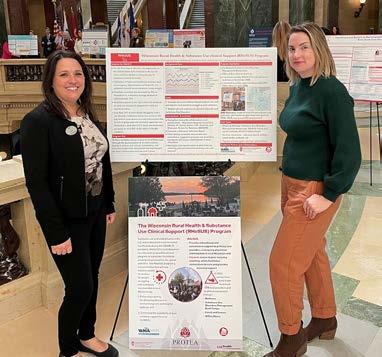
Key 2023 accomplishments include:
• Collaborated with esteemed stakeholders including the Wisconsin Society for Addiction Medicine
• Continued ongoing connections with the Advisory Board comprising representatives from organizations throughout rural regions of Wisconsin
• Launched the second series of the RHeSUS Lunch and Learn webinars, which now offer enduring continuing education credits
• Facilitated two in-person Substance Use Disorder Management Boot Camps, in Menominee in spring 2023 and La Crosse in fall 2023
• Participated in conference poster presentations to showcase RHeSUS achievements
Although challenging to quantify, RHeSUS has significantly improved access to evidence-based care for rural residents struggling with addiction. Looking ahead, continued collaboration and innovative approaches will sustain and expand RHeSUS's impact, with a focus on increasing provider confidence in addiction medicine and reducing stigma.
Funding for these efforts is provided by the UW School of Medicine and Public Health from the Wisconsin Partnership Program (WPP).

Substance use disorders necessitate a multidisciplinary approach, involving diverse health care providers and support personnel to ensure a holistic and comprehensive treatment and care strategy. The escalating rate of emergency department (ED) visits linked to drug use highlights the need for targeted interventions. Emergency physicians can play a pivotal role in preventing opioid overdose deaths by providing naloxone to at-risk patients. Distributing naloxone in the ED is a simple and cost-effective method to offer a lifesaving intervention. As such, EDs are integral to opioid overdose prevention efforts.
WHA proudly partners with Dr. Ritu Bhatnagar and the Wisconsin Society for Addiction Medicine (WISAM) to support an Emergency Department Overdose Response Protocol (ORP). This initiative involves distributing Hospital Overdose Prevention Effort (HOPE) kits containing naloxone and risk reduction resources. The protocol aims to connect individuals at risk of opioid overdose to evidence-based harm reduction strategies and medication for opioid use disorders (MOUD).
Throughout 2023, WHA assisted WISAM in planning and implementing the ORP in 11 Wisconsin EDs. By 2024, these EDs will be fully equipped to respond effectively to opioid-related incidents, providing peer support, distributing HOPE kits, initiating MOUD and facilitating referrals to ongoing treatment such as primary care providers and behavioral health services.
Naloxone distribution in EDs is a critical harm reduction strategy that saves lives and empowers patients and their communities. Expanding access to naloxone can significantly reduce opioid-related fatalities. To learn more about the ORP or how to implement it in your ED, contact Jill Lindwall at jlindwall@wha.org

The WHA Quality Center underwent a redesign in 2023. Serving as a dedicated hub, it offers access to the latest updates on quality and patient safety initiatives, along with a wealth of resources, tools, educational opportunities, webinars, self-paced modules and news. It is a dynamic platform continuously updated and reviewed for relevant content. This platform serves as a vital conduit for spreading awareness and facilitating access to valuable resources aimed at enhancing health care quality. Visitors can navigate through resources using provided hashtags (e.g., #agefriendly, #OUD) or by selecting topics of interest from the left-side navigation. The Quality Center link is easily shareable with individuals across all levels, from frontline staff to C-suite executives, and beyond, who stand to benefit from its diverse range of topics. Access the WHA Quality Center here or go to WHA - Quality & Patient Safety
WHA and WORH Partner for Reducing Readmissions, Improving Patient Satisfaction (HCAHPS) and Implementation of 4Ms Framework for an Age-Friendly Health System
The Wisconsin Hospital Association (WHA), in partnership with the Wisconsin Office of Rural Health, spearheaded three initiatives aimed at enhancing rural hospital performance and patient outcomes in Wisconsin. These programs focused on 1) reducing readmissions, 2) improving patient satisfaction and 3) implementing the 4Ms Age-Friendly framework.

1. WHA hosted CHaSCI Bridge Model training by Rush University Medical Center, offering hospitals monthly coaching to reduce readmissions. The holistic model addresses psychosocial factors, social determinants of health, and patient engagement, enhancing care continuity and preventing complications through comprehensive support and community connections, addressing potential issues before they escalate to readmissions.
2. Enrolled hospitals monitored their Hospital Consumer Assessment of Healthcare Providers and Systems (HCAHPS) scores on CheckPoint, particularly focusing on patients' understanding of their care upon discharge and staff's provision of discharge instructions. WHA assisted hospitals in identifying gaps and implementing improvement strategies, leading to notable enhancements in HCAHPS measures, with some hospitals achieving scores exceeding 94-96%.
3. Additionally, WHA facilitated the introduction of the 4Ms Framework for an Age-Friendly Health System to critical access and small rural hospitals. Through training and coaching support, hospitals assessed their readiness to implement the framework and developed tailored plans aligned with their internal capacity. Practical tools and resources were provided for integrating the 4Ms into hospital workflows, ensuring consistency with guidelines and enabling seamless implementation.
Participating hospitals in these initiatives included Bellin Health System, Door County Medical Center, Grant Regional Health Center, Gundersen Health System, Marshfield Medical Center-Ladysmith, Marshfield Medical Center-Rice Lake, SSM Health System, St. Croix Health, The Richland Hospital and Clinics, Tomah Health and Western Wisconsin Health.
Through these collaborative efforts, WHA and its partners are driving positive change and advancing health care quality in rural Wisconsin communities.

The Paul Coverdell National Acute Stroke Program is dedicated to enhancing stroke care quality nationwide. WHA collaborates with the Wisconsin Department of Health Services (DHS) and the Wisconsin Coverdell Stroke Initiative to advance equity and quality in stroke prevention and care, particularly for high-risk individuals.
In 2023, WHA hosted two Stroke Learning & Action Network (LAN) events focused on seamless clinic and community connections for stroke care across the continuum. The well-attended events included stroke coordinators, emergency department directors, registered nurses and quality leaders from many Wisconsin hospitals and health systems.
WHA Physician Quality Improvement Advisor Dr. Bobby Redwood led engaging discussions emphasizing Wisconsin's pioneering role in county health rankings, and provoking questions such as, “What would the future look like if we decreased stroke risk through community change?” Additionally, stroke care experts from Advocate Aurora Health, Froedtert Hospital, The Richland Hospital, and Ascension All Saints Hospital shared innovative strategies on stroke systems of care and risk reduction efforts taking place in their communities.
With current funding set to end in June 2024, the Wisconsin Coverdell Team anticipates a new CDC cooperative agreement focusing on stroke prevention through hypertension management, enhanced stroke care via data collection, strengthening team-based care, increased access to social support and better linkage between clinical and community resources.
Efforts will include engaging hospitals in learning collaboratives to improve stroke care in rural settings, extending successful practices to hubs and their spoke hospitals not using Get With The Guidelines® (GWTG).
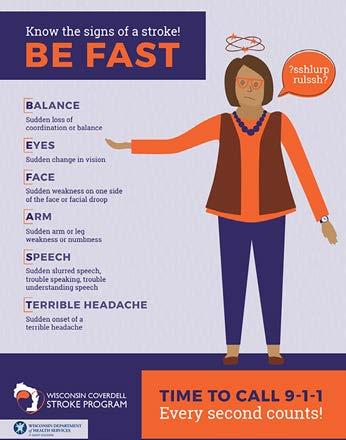
By prioritizing these areas, WHA aims to support Wisconsin hospitals in reducing stroke incidence and impact through coordinated care, data-driven improvements and targeted interventions that address disparities and promote equity in stroke treatment and outcomes.
Since its inception in 2015 by collaborative efforts among Dane County emergency departments (ED), urgent care centers (UCC), family medicine, and dental and public health leaders, the Wisconsin Dental Pain Protocol (WDPP) has been pivotal in addressing the opioid epidemic. The initiative aims to establish effective intake, treatment and discharge protocols for dental pain and infection while minimizing opioid usage and promoting definitive treatment for emergent oral health issues.
Formally launched statewide in 2019 with funding from the Wisconsin Department of Health Services, pilot sites across Dane, La Crosse, Polk, Barron, Brown, and Oconto counties witnessed immediate impacts. Nicole Huber, PA-C, from Cumberland Healthcare Emergency Department, highlighted the transformative impact of the program on their emergency room operations.
"Previously, nearly all patients seeking care for non-traumatic dental pain were prescribed opioids," Huber explained. "Now, opioid prescriptions for dental pain are rare, with the majority of patients being offered the dental block alternative, when suitable."
With over 140 providers trained in non-opioid pain control and infection management, communities have observed a standardized approach to oral pain and infection control. Notably, La Crosse County reported a substantial decrease in opioid prescriptions, from 33% to 13%.
Kari J. Clark, RN, nurse manager at Amery Hospital and Clinic, noted positive outcomes from WDPP implementation, including reduced opioid prescriptions, increased use of local anesthetics and a decline in repeat visits. The referrals also helped people who had no alternatives for dental care.
With over 20,000 annual visits to Wisconsin EDs and UCCs, the WDPP delivers evidence-based diagnosis, treatment, and care management for oral pain and infection, ensuring the highest standard of care while optimizing staff time and resources. The WDPP also forges partnerships and referral systems within communities, guaranteeing that patients with dental pain receive definitive treatment for their underlying issues.

Building robust referral systems for post-discharge dental care has been challenging, but communities are succeeding. Since 2019, WDPP's care coordination has facilitated over 5,000 dental care referrals, reducing recidivism by ensuring patients receive necessary treatments like tooth extractions.
The WDPP is a comprehensive approach involving EDs, UCCs, dentists, and community partners to decrease opioid prescriptions for non-traumatic dental pain. Additionally, the WDPP has responded to the DHS's call for improved antimicrobial stewardship in emergency dental care. WHA's Physician Quality Improvement Advisor Dr. Bobby Redwood collaborates with WDPP dental experts to develop best practices for ED antibiotic prescribing in non-traumatic dental pain. These resources, available by the end of the summer 2024, will complement WDPP's core mission of opioid stewardship in ED dental care.
More information on the WDPP, including background information, written training materials, webinars and opportunities for facilitated training can be found on the WDPP Clearinghouse at www.widentalpainprotocol.com
The Wisconsin Hospital Association (WHA) serves on the Project Advisory Council of Wisconsin Health Literacy’s Medication Label Initiative, which aims to simplify medication information for patients. The council includes representatives from Advocate Aurora Health, Emory University School of Medicine, Epic Systems, Medical College of Wisconsin, MetaStar, Pharmacy Society of Wisconsin, University of Georgia College of Pharmacy, United States Pharmacopeia, Wisconsin Medical Society, UW Health, and UW School of Pharmacy.


Many patients face challenges in taking their medications correctly due to unclear directions and complex regimens. To address this, researchers developed and tested the Universal Medication Schedule (UMS), which uses health literacy best practices to specify clear medication times ('morning,' 'noon,' 'evening,' and 'bedtime') and numerals instead of spelledout numbers. Advocate Aurora Health has adopted UMS directions systemwide, and by June 2023, had prescribed 204,000 prescriptions using UMS, the highest number in Wisconsin (per Epic). Health systems interested in UMS implementation can access this toolkit for background toolkit with background information, key message, and planning steps. This initiative is funded by the Advancing a Healthier Wisconsin Endowment of the Medical College of Wisconsin.
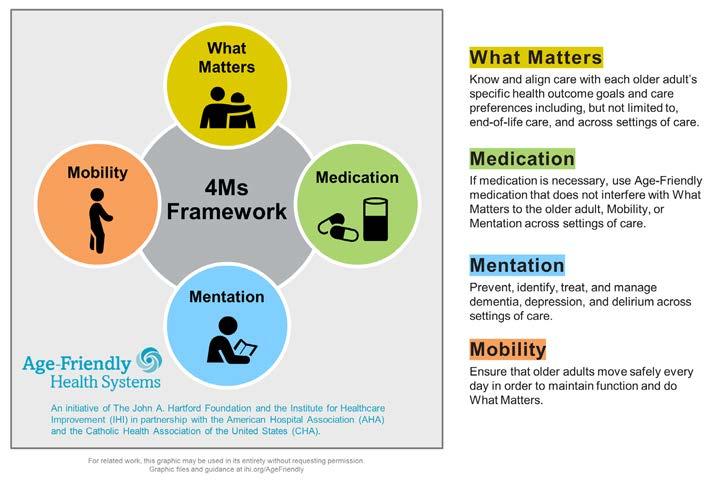
Age-Friendly Health Systems, a national initiative led by the John A. Hartford Foundation and the Institute for Healthcare Improvement in partnership with the American Hospital Association, focuses on four key elements of geriatric care known as the “4Ms”: What Matters, Medication, Mentation, and Mobility. Throughout 2022 and 2023, WHA has partnered with the Wisconsin Geriatric Education Consortium, the Rural Wisconsin Health Cooperative, and multiple Wisconsin hospitals to promote and implement the 4Ms framework.
The goal is to enhance the quality of care for older adults by implementing the 4Ms Framework of Age-Friendly Health Systems throughout Wisconsin. Objectives include training Wisconsin health workforce on the 4Ms framework and support continued licensure by providing continuing education to licensed health care providers, and to support the implementation of the 4Ms framework by creating an Age-Friendly Health Systems action community in Wisconsin. This includes hosting peer support meetings, offering travel awards for onsite mentoring, and applying Geriatric Fast Facts and Palliative and End of Life Care.
This important work demonstrates Wisconsin hospitals’ commitment to improving age friendly systems of care, thereby enhancing overall patient outcomes across Wisconsin.

"I truly enjoyed the opportunity to network with peers and view others' quality projects."
- 2024 Health Care Quality Showcase participant
The second annual Health Care Quality Showcase was held March 20, 2024 at the Capitol Rotunda in conjunction with WHA’s Advocacy Day.
Hospital quality leaders from 23 Wisconsin hospitals showcased their quality and patient safety improvement successes with posters featuring their projects. This was a valuable opportunity to inform elected officials, other Advocacy Day attendees from around the state as well as the public about quality and patient safety-focused advancements in Wisconsin’s hospitals. See Health Care Quality Showcase participants for a listing of the hospital participants and their improvement projects by topic.
See photos from the quality improvement showcase here
“It was really nice to walk around the posterboards showcased and speak to the different teams about their projects."
- 2024 Health Care Quality Showcase participant
*indicates project shared at poster showcase on Advocacy Day 2024.
1. Advocate Aurora Health*
Advocate Health Midwest's 2023 Age-Friendly Implementation and Mentorship Efforts
2. Ascension Wisconsin* Creating a Community: Ascension All Saints Stroke Support Group
3. Aurora Lakeland Medical Center* Improving Care for Older Adults at Aurora Lakeland Medical Center through Age-Friendly Implementation
4. Aurora Medical Center Burlington* Improving Care for Older Adults at Aurora Medical Center Burlington Through Age-Friendly Implementation
5. Aurora Medical Center Kenosha* Improving Care for Older Adults at Aurora Medical Center Kenosha Through Age-Friendly Implementation
6. Aurora Medical Center Manitowoc County* Standardized Huddle and Visual Management Board Implementation
7. Aurora Medical Center Mount Pleasant* Improving Care for Older Adults at Aurora Medical Center Mount Pleasant through Age-Friendly Implementation
8. Aurora West Allis Medical Center* Improving Care for Older Adults at Aurora West Allis Medical Center Through Age-Friendly Implementation
9. Bellin Hospital, Green Bay* 24 Hour Newborn Procedures Performed Skin-to-Skin
10. Bellin and Gundersen Health System* Inpatient Sepsis Improvements
11. Children’s Wisconsin* Food Insecurity Screening and Intervention in a Level 1 Pediatric Emergency Department Trauma Center
12. Emplify Health (Bellin & Gundersen) Mortality Reduction Strategies
13. Fort HealthCare, Fort Atkinson* Advancing Health Equity in Rural Communities
14. Froedtert Holy Family Memorial* Leveraging Hospital-Hospice Collaboration: Reducing Mortality Index Rate
15. Hudson Hospital & Clinic* The Reality Behind Mortality of Our Hospital Inpatients
16. Hudson Hospital & Clinic Strategies to Reduce High-Dose Opioid Prescriptions at Discharge for Cesarean Section Patients
17. Hudson Hospital & Clinic Achieving Faster Door-to-Needle (DTN) Times
18. Gundersen St. Joseph's Hospital & Clinic* Coordinating Care: Mammography and Wellness Visits
19. Mayo Clinic Health System, Eau Claire* Prevention of Emergency Department Diversion
20. Reedsburg Area Medical Center* Strive for 5: QAPI The Path to Awesome
21. The Richland Hospital and Clinics* Transitional Care Management: Direct Impact on Reduction in Readmission Rate
22. Southwest Health, Platteville* Reduction of the Primary C-Section Rate
23. Spooner Health Our Journey to Reducing Falls: A Comprehensive Approach to Patient Safety
24. SSM Health St. Mary's Hospital, Madison SSM Health St. Mary’s Hospital – Madison Ensures Appropriate C. diff Infection Diagnosis and Treatment
25. SSM Health Wisconsin SSM Health Wisconsin Adopts Early NEWS2 Screening to Speed Treatment for Deadly Sepsis Infections
26. Tamarack Health Ashland Medical Center Standardizing Code Carts for Enhanced Code Blue Reliability
27. ThedaCare Medical Center, Neenah* A Performance Improvement Project: Blood Culture Contamination Reduction in the ED
28. Tomah Health* MOVIN on Acute Care
29. UnityPoint Health-Meriter, Madison Poster Fair Highlights Unit-Specific Quality Improvement Efforts
30. UnityPoint Health-Meriter, Madison Unique Hospital Unit Provides Seamless Care Faster and Reduces Holds in Area Emergency Departments
31. UW Health American Famly Children's Hospital HgbA1C Workflow Improvement
32. UW Health, Madison Making a Digital Connection: Empowering and Engaging Patients During Their Pregnancy Journey
33. Vernon Memorial Healthcare, Viroqua Transitional Care Management (TCM)
34. Western Wisconsin Health, Baldwin Implementation and Impact of Bedside Interdisciplinary Rounding
35. Westfields Hospital & Clinic, New Richmond* Improving Diabetes D5 Quality Metrics
AdventHealth Durand, Durand
Amery Hospital & Clinic, Amery
Ascension All Saints Hospital, Racine
Ascension Calumet Hospital, Chilton
Ascension Columbia St. Mary's Hospital Milwaukee, Milwaukee
Ascension Columbia St. Mary's Hospital Ozaukee, Mequon
Ascension NE Wisconsin - Mercy Campus, Oshkosh
Ascension NE Wisconsin - St. Elizabeth Campus, Appleton
Ascension Sacred Heart Rehabilitation Hospital, Mequon
Ascension SE Wisconsin Hospital - Elmbrook Campus, Brookfield
Ascension SE Wisconsin Hospital - Franklin Campus, Franklin
Ascension SE Wisconsin Hospital - St. Joseph Campus, Milwaukee
Ascension St. Francis Hospital, Milwaukee
Ascension Wisconsin Hospital - Greenfield, Greenfield
Ascension Wisconsin Hospital - Menomonee Falls, Menomonee Falls
Ascension Wisconsin Hospital - Waukesha, Waukesha
Aspirus Divine Savior Hospital & Clinics, Portage
Aspirus Eagle River Hospital, Eagle River
Aspirus Langlade Hospital, Antigo
Aspirus Medford Hospital & Clinics, Inc., Medford
Aspirus Merrill Hospital, Merrill
Aspirus Plover Hospital, Stevens Point
Aspirus Rhinelander Hospital, Rhinelander
Aspirus Riverview Hospital & Clinics, Inc., Wisconsin Rapids
Aspirus Stanley Hospital, Stanley
Aspirus Stevens Point Hospital, Stevens Point
Aspirus Tomahawk Hospital, Tomahawk
Aspirus Wausau Hospital, Wausau
Aurora BayCare Medical Center, Green Bay
Aurora Lakeland Medical Center, Elkhorn
Aurora Medical Center - Bay Area, Marinette
Aurora Medical Center - Grafton, Grafton
Aurora Medical Center - Kenosha, Kenosha
Aurora Medical Center - Mount Pleasant, Mount Pleasant
Aurora Medical Center - Oshkosh, Oshkosh
Aurora Medical Center - Sheboygan County, Sheboygan
Aurora Medical Center - Summit, Summit
Aurora Medical Center - Washington County, Hartford
Aurora Medical Center Burlington, Burlington
Aurora Medical Center Manitowoc County, Two Rivers
Aurora Psychiatric Hospital, Wauwatosa
Aurora Sinai Medical Center, Milwaukee
Aurora St. Luke's Medical Center, Milwaukee
Aurora St. Luke's South Shore, Cudahy
Aurora West Allis Medical Center, West Allis
Bellin Health Oconto Hospital, Oconto
Bellin Hospital, Green Bay
Bellin Psychiatric Center, Green Bay
Beloit Health System, Beloit
Black River Memorial Hospital, Inc., Black River Falls
Burnett Medical Center, Grantsburg
Children's Wisconsin - Fox Valley Hospital, Neenah
Children's Wisconsin - Milwaukee Hospital, Milwaukee
Clement J. Zablocki VA Medical Center, Milwaukee
Crossing Rivers Health Medical Center, Prairie du Chien
Cumberland Healthcare, Cumberland
Door County Medical Center, Sturgeon Bay
East Madison Hospital, Madison
Edgerton Hospital and Health Services, Edgerton
Encompass Health Rehabilitation Hospital of Fitchburg
Essentia Health St. Mary's Hospital - Superior, Superior
Fort HealthCare, Fort Atkinson
Froedtert Bluemound Rehabilitation Hospital, Wauwatosa
Froedtert Community Hospital - Mequon, Mequon
Froedtert Community Hospital - New Berlin, New Berlin
Froedtert Community Hospital - Oak Creek, Oak Creek
Froedtert Community Hospital - Pewaukee, Pewaukee
Froedtert Holy Family Memorial, Manitowoc
Froedtert Hospital, Milwaukee
Froedtert Menomonee Falls Hospital, Menomonee Falls
Froedtert West Bend Hospital, West Bend
Granite Hills Hospital, West Allis
Grant Regional Health Center, Lancaster
Gundersen Boscobel Area Hospital and Clinics, Boscobel
Gundersen Lutheran Medical Center, La Crosse
Gundersen Moundview Hospital and Clinics, Friendship
Gundersen St. Joseph's Hospital and Clinics, Hillsboro
Gundersen Tri County Hospital & Clinics, Whitehall
Howard Young Medical Center, Woodruff
HSHS St. Clare Memorial Hospital, Oconto Falls
HSHS St. Mary's Hospital Medical Center, Green Bay
HSHS St. Nicholas Hospital, Sheboygan
HSHS St. Vincent Hospital, Green Bay
Hudson Hospital & Clinic, Hudson
Indianhead Medical Center/Shell Lake, Shell Lake
Lakeview Specialty Hospital & Rehab, Waterford
Marshfield Medical Center, Marshfield
Marshfield Medical Center - Beaver Dam, Beaver Dam
Marshfield Medical Center - Eau Claire, Eau Claire
Marshfield Medical Center - Ladysmith, Ladysmith
Marshfield Medical Center - Minocqua, Minocqua
Marshfield Medical Center - Neillsville, Neillsville
Marshfield Medical Center - Park Falls, Park Falls
Marshfield Medical Center - Rice Lake, Rice Lake
Marshfield Medical Center - Weston, Weston
Marshfield Medical Center-River Region at Stevens Point
Mayo Clinic Health System - Chippewa Valley in Bloomer
Mayo Clinic Health System - Eau Claire, Eau Claire
Mayo Clinic Health System - La Crosse, La Crosse
Mayo Clinic Health System - Northland in Barron, Barron
Mayo Clinic Health System - Oakridge in Osseo, Osseo
Mayo Clinic Health System - Red Cedar in Menomonie
Mayo Clinic Health System - Sparta, Sparta
Memorial Hospital of Lafayette Co., Darlington
Mercyhealth Hospital and Medical Center - Walworth, Lake Geneva
Mercyhealth Hospital and Trauma Center - Janesville, Janesville
Midwest Orthopedic Specialty Hospital, Franklin
Mile Bluff Medical Center, Mauston
Milwaukee Rehabilitation Hospital at Greenfield
Miramont Behavioral Health, Middleton
Orthopaedic Hospital of Wisconsin, Glendale
Osceola Medical Center, Osceola
Prairie Ridge Health, Columbus
ProHealth Oconomowoc Memorial Hospital, Oconomowoc
ProHealth Rehabilitation Hospital of Wisconsin, Waukesha
ProHealth Waukesha Memorial Hospital, Waukesha
ProHealth Waukesha Memorial Hospital, Mukwonago
Reedsburg Area Medical Center, Reedsburg
River Falls Area Hospital, River Falls
Rogers Behavioral Health in Oconomowoc, Oconomowoc
Sauk Prairie Healthcare, Prairie du Sac
Select Specialty Hospital - Milwaukee - St. Francis, Milwaukee
Select Specialty Hospital - Milwaukee - West Allis, West Allis
Select Specialty Hospital-Madison, Madison
Southwest Health, Platteville
Spooner Health, Spooner
SSM Health Monroe Hospital, Monroe
SSM Health Ripon Community Hospital, Ripon
SSM Health St. Agnes Hospital, Fond du Lac
SSM Health St. Clare Hospital - Baraboo, Baraboo
SSM Health St. Mary's Hospital, Madison
SSM Health St. Mary's Hospital - Janesville, Janesville
SSM Health Waupun Memorial Hospital, Waupun
St. Croix Health, St. Croix Falls
Stoughton Health, Stoughton
Tamarack Health Ashland Medical Center, Ashland
Tamarack Health Hayward Medical Center, Hayward
The Richland Hospital, Inc., Richland Center
ThedaCare Medical Center - Berlin, Berlin
ThedaCare Medical Center - New London, New London
ThedaCare Medical Center - Shawano, Shawano
ThedaCare Medical Center - Waupaca, Waupaca
ThedaCare Medical Center - Wild Rose, Wild Rose
ThedaCare Regional Medical Center-Appleton, Appleton
ThedaCare Regional Medical Center-Neenah, Neenah
Tomah Health, Tomah
Tomah VA Medical Center, Tomah
UnityPoint Health - Meriter, Madison
University Hospital, Madison
Upland Hills Health, Inc., Dodgeville
UW Health Rehabilitation Hospital, Madison
Vernon Memorial Healthcare, Viroqua
Watertown Regional Medical Center, Watertown
Western Wisconsin Health, Baldwin
Westfields Hospital & Clinic, New Richmond
William S. Middleton Memorial Veterans Hospital, Madison
Willow Creek Behavioral Health, Green Bay
